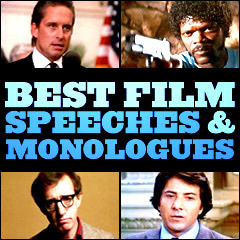|
Best Film Speeches and Monologues
|
|
Title Screen
|
Film Title/Year and Description of Film Speech/Monologue |
Screenshots
|
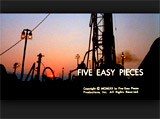
|
Five
Easy Pieces (1970)
Screenwriter(s): Carole Eastman (Adrien
Joyce)
 Prophetic
Words Against "Crap" and "Filth" Prophetic
Words Against "Crap" and "Filth"
Aggressive but morose lesbian hitchhiker, Palm
Apodaca (Helena Kallianiotes), a long-haired malcontent who was
an anti-filth, ecology nut on her way to Alaska because it was
"cleaner," preached prophetically about her discontent
regarding
"crap" and "filth," in a memorable ranting
monologue:
I had to leave this place because I got depressed
seeing all the crap. And the thing is, they're making more crap,
you know. They got so many stores and stuff and junk full of
crap. I can't believe it...Who? Man, that's who. Pretty soon,
there won't be any room for man. They're selling more crap that
people go and buy than you can imagine. Crap. I believe everybody
should have a big hole where they throw the stuff in and burn
it...
A disposal? What's that, but more crap? I've never
seen such crap...People's homes, just filth. I've been in people's
homes...I'm seeing more filth, a lot of filth. What they need
to do every day, no, once in a while, is do a cockroach thing,
you know, where they, uh, spray the homes, Can you imagine if
their doors were painted a pretty color and they had a pot outside...and
they picked up. I mean, then it wouldn't be filthy, with uh,
Coke bottles and whisky and uh (she pauses to puff on her cigarette)
(Pointing at billboards and roadside signs), those signs everywhere.
Well, they should be erased! All those signs selling you
crap and more crap and more crap. And I - I don't know. I don't
know. I don't even want to talk about it...It's just filthy. People
are filthy. I think that's the biggest thing that's wrong with
people. I think they wouldn't be as violent if they were clean,
because then they wouldn't have anybody to pick on. Dirt. Not dirt.
See, dirt isn't bad. It's filth. Filth is bad. That's what starts
maggots and riots.
For a few more miles (while the other passengers
napped) after an aborted restaurant stop, Palm resumed her rant
about filthy human beings:
People.
(Shaking her head in disgust) Animals are not like that. They're
always cleaning themselves. Did you ever see, uhmm, pigeons?
Well, he's always picking on himself and his friends. They're
always picking bugs out of their hair all the time. Monkeys too.
Except they do something out in the open that I don't go for.
She added one more example
of man creating a stink for himself, and suggested a capitalistic
conspiracy against having steam-powered cars:
You know, I read where
they, uh, invented this car that runs on, uhm, that runs on,
uhm? When you boil water?...Right, steam. A car that you could
ride around in and not cause a stink. But do you know they will
not even let us have it? Can you believe it? Why? Man! He likes
to create a stink! I mean, I've seen filth that you wouldn't
believe. Ugh! What a stink! I don't even wanna talk about it.
|
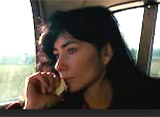
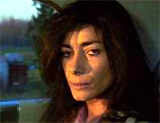
|

|
Five
Easy Pieces (1970)
Screenwriter(s): Carole Eastman (Adrien Joyce)
 Angry "Diner" Speech
Tirade Angry "Diner" Speech
Tirade
Play clip (excerpt): 
In a roadside cafe-diner, in a booth for four
by a window, Bobby Dupea (Jack Nicholson) was aggravated,
impatient and exasperated by meaningless rules. A live-by-the-rules,
inflexible waitress (Lorna Thayer) stubbornly refused to serve
Bobby a plain omelette (with tomatoes instead of potatoes),
a cup of coffee and a side order of wheat toast, because she
dryly explained: "No
substitutions":
Dupea: I'd like a plain omelette. No potatoes.
Tomatoes instead. A cup of coffee, and wheat toast.
Waitress: (She pointed to the menu) No substitutions.
Dupea: What do you mean? You don't have any tomatoes?
Waitress: Only what's on the menu. You can have
a number two - a plain omelette. It comes with cottage
fries and rolls.
Dupea: Yeah, I know what it comes with. But it's not what
I want.
Waitress: Well, I'll come back when you make up your mind.
Dupea: Wait a minute. I have made up my mind. I'd
like a plain omelette. No potatoes on the plate. A cup
of coffee, and a side order of wheat toast.
Waitress: I'm sorry, we don't have any side orders of toast.
I'll give you an English muffin or a coffee roll.
Dupea: What do you mean, you don't make side orders of
toast? You make sandwiches, don't you?
Waitress: Would you like to talk to the manager?
Dupea: ...You've got bread and a toaster of some kind?
Waitress: I don't make the rules.
Dupea: OK, I'll make it as easy for you as I can. I'd like
an omelette, plain, and a chicken salad sandwich on wheat
toast. No mayonnaise, no butter, no lettuce, and a cup
of coffee.
Waitress: A number two. A chicken sal san. Hold the butter,
the lettuce and the mayonnaise. And a cup of coffee. Anything
else?
Dupea: Yeah. Now all you have to do is hold the
chicken, bring me the toast, give me a check for the
chicken salad sandwich, and you haven't broken any rules.
Waitress (spitefully with her arms on her hips): You want
me to hold the chicken, huh?
Dupea: I want you to hold it between your knees.
Waitress (turning and telling him to look at the sign
that said, "Right to Refuse Service") Do you
see that sign, sir? Yes, you all have to leave. I'm not
taking any more of your smartness and sarcasm.
Dupea: You see this sign?
With one gesture with his right arm, he swept
all the water glasses, place-mats, cutlery and menus off
the table. |
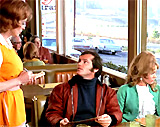
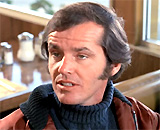
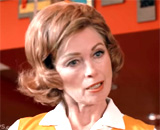
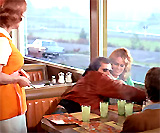
|

|
Five
Easy Pieces (1970)
Screenwriter(s): Carole Eastman (Adrien
Joyce)
 Final
Words to a Dying Father Final
Words to a Dying Father
In a most powerful
sequence, Bobby Dupea (Jack Nicholson) was viewed wheeling
his father Nicholas (William Challee) in a wheelchair in
the cold outdoors, as the sun set. At the shoreline, he
delivered a painful, one-sided, remorseful confession to
his father, who was unable to respond due to his medical
condition. He apologized for his abandonment of his family
and talent, for giving up on his responsibilities, and for
not living up to his father's high ideals. Unable to explain
his life's failings, he broke down in tears mid-speech,
and eventually apologized:
I don't know if you'd be particularly interested
in hearing anything about me, my life, I mean. Most of
it doesn't add up to much that I could relate as a way
of life that you'd approve of. I move around a lot. Not
because I'm looking for anything, really, but - 'cause
I'm getting away from things that get bad if I stay. Auspicious
beginnings. You know what I mean?
I'm trying to imagine your, your half of
this conversation...My feeling is, I don't know, that,
uh, if you could talk, we probably wouldn't be talking.
That's pretty much the way it got to be before I left.
Are you all right? I don't know what to say.
Tita suggested that we try to - .I don't
know. I think that she feels - I think that she feels that
we've got some understanding to reach. She totally denies
the fact that we were never that comfortable with one another
to begin with. The best that I can do is apologize. We
both know that I was never really that good at it, anyway.
He finally admitted with sorrow: "I'm
sorry it didn't work out." He slowly bowed his head. |



|
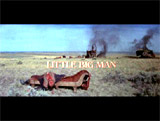
|
Little Big Man
(1970)
Screenwriter(s): Calder Willingham
 The
White Man's Beliefs: "Everything is Dead" The
White Man's Beliefs: "Everything is Dead"
As he held up a white man's scalp, Old Lodge
Skins (Chief Dan George) described to Little Big Man/Jack Crabb
(Dustin Hoffman) the difference in beliefs between the White
Man and the "Human Beings" (their Indian tribe),
after being asked if he hated the White Man:
Do you see this fine thing? Do you admire
the humanity of it? Because the Human Beings, my son, they
believe everything is alive. Not only man and animals,
but also water, earth, stone. And also the things from
them like that hair. The man from whom this hair came,
he's bald on the other side, because I now own his scalp!
That is the way things are. But the white man, they believe everything is
dead. Stone, earth, animals, and people! Even their own
people! If things keep trying to live, white man will rub
them out. That is the difference.
|

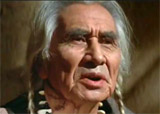
|
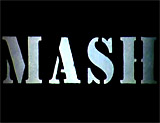
|
M*A*S*H
(1970)
Screenwriter(s): Ring Lardner, Jr.
 "We
Are the Pros..." "We
Are the Pros..."
Capt. Trapper John (Elliott Gould) gave orders
to hostile chief nurse Captain Peterson (Cathleen Cordell)
of the Nurse Corps, after he and Hawkeye Pierce (Donald Sutherland)
were accused of being "hoodlums"
in the hospital:
Look, mother, I want to go to work in one
hour. We are the pros from Dover and we figure to crack
this kid's chest and get out to the golf course before
it gets dark. So you go find the gas-passer and you have
him pre-medicate this patient. Then bring me the latest
pictures on him. The ones we saw must be 48 hours old by
now. Then, call the kitchen and have them rustle us up
some lunch. Ham and eggs'll be all right. Steak would
be even better. And then give me at least ONE nurse who
knows how to work in close without getting her TITS in
my way!
|
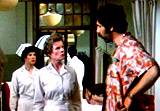

|
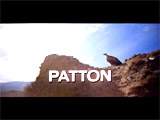
|
Patton
(1970)
Screenwriter(s): Francis Ford Coppola, Edmund H. North
 Opening "Address" to
the Troops Opening "Address" to
the Troops

Play clips (excerpt):  
Gen. George S. Patton (George C. Scott) gave
a six-minute opening address to the troops of the US 3rd Army
before a giant American flag on a bare stage. His barking address
(composed of actual speech content delivered by Patton) was
given to off-screen troops unseen in the audience:
...Now I want you to remember that no bastard
ever won a war by dying for his country. He won it by making
the other poor dumb bastard die for his country.
Men, all this stuff you've heard about America not wanting
to fight - wanting to stay out of the war, is a lot of
horse dung. Americans traditionally love to fight. All real Americans love the
sting of battle. When you were kids, you all admired the
champion marble shooter, the fastest runner, the big league
ball players, the toughest boxers. Americans love a winner
and will not tolerate a loser. Americans play to win all
the time. I wouldn't give a hoot in hell for a man who
lost and laughed. That's why Americans have never lost
and will never lose a war, because the very thought of
losing is hateful to Americans.
Now, an army is a team - it lives, eats, sleeps,
fights as a team. This individuality stuff is a bunch of
crap. The bilious bastards who wrote that stuff about individuality
for the Saturday Evening Post don't know anything
more about real battle than they do about fornicating. Now,
we have the finest food and equipment, the best spirit, and
the best men in the world. You know, by God, I actually pity
those poor bastards we're goin' up against. By God, I do.
We're not just gonna shoot the bastard, we're going to cut
out their living guts and use them to grease the treads of
our tanks. We're going to murder those lousy Hun bastards
by the bushel.
Now, some of you boys, I know, are wondering
whether or not you'll chicken out under fire. Don't worry
about it. I can assure you that you will all do your duty.
The Nazis are the enemy. Wade into them, spill their blood,
shoot them in the belly. When you put your hand
into a bunch of goo that a moment before was your best friend's
face, you'll know what to do.
Now there's another thing I want you to remember.
I don't want to get any messages saying that we are holding
our position. We're not holding anything. Let the Hun do
that. We are advancing constantly and we're not interested
in holding onto anything except the enemy. We're going to
hold onto him by the nose and we're gonna kick him in the
ass. We're gonna kick the hell out of him all the time and
we're gonna go through him like crap through a goose.
Now, there's one thing that you men will be
able to say when you get back home, and you may thank God
for it. Thirty years from now when you're sitting around
your fireside with your grandson on your knee, and he asks
you: 'What did you do in the Great World War II?', you won't
have to say: 'Well, I shoveled s--t in Louisiana.'
All right now, you sons-of-bitches, you know
how I feel - and I will be proud to lead you wonderful guys
into battle anytime, anywhere. That's all.
|

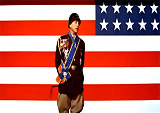
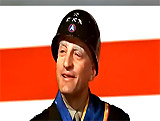
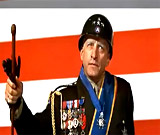
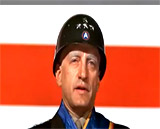
|
